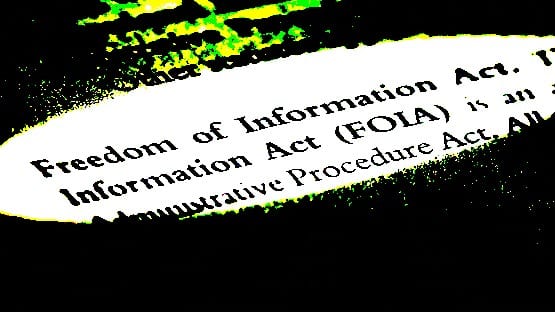
We have a preliminary answer on how much the legal “crap” that the Augusta County Board of Supervisors is making its taxpayers foot the bill for so that it can fight a court order on an illegally-held closed meeting has cost so far.
The total to date: $5,976.
This is from a records request made by county resident Stephen Morris that was answered by Kathleen Keffer, the assistant county attorney, on Tuesday.
We’re still waiting for the court order that was handed down by an Augusta County Circuit Court judge on Jan. 11 to be formally entered.
There’s no word at this stage when that will happen.
The Board of Supervisors, in a 6-1 vote on Jan. 24, authorized an appeal of the court order from Judge Thomas J. Wilson IV.
The wheels of justice turn mighty slowly in Augusta County.
The illegally-held closed meeting at question in the legal matter brought by AFP and Breaking Through Media dates way back to March 20, 2023, nearly a year ago now.
It was revealed in July that one of the members of the Board of Supervisors, Scott Seaton, had been secretly recording closed meetings of the board.
The same 6-1 majority that we see on almost all matters of importance in county policymaking requested that Seaton turn over possession of the recordings; he responded by giving over copies of the digital files on Aug. 9.
AFP and Breaking Through Media independently then cited the Virginia Freedom of Information Act in separate filings to request that the county make public a digital copy of the recording of the March 20 meeting, in which board members discussed the resignation of South River Supervisor Steven Morelli, and ostensibly at least two women who had accused Morelli of sexual harassment, which reportedly factored heavily into his decision to resign.
The county denied both requests. AFP filed the first appeal, which was heard in Augusta County General District court on Sept. 5.
Judge Rupen R. Shah upheld the county’s decision to deny the FOIA request, declaring that that the recordings were not subject to FOIA because they were made by Seaton “for simply self-serving purpose,” and that they were “not a record of the agency nor is kept in a normal course of its business.”
Wilson, in his Jan. 11 court order, overturned Shah on that significant point, ruling in the AFP case that the recordings, “having been turned over to the County, are now County public records and no longer the private property of Dr. Seaton.”
In the Breaking Through Media case, Wilson cited a 2020 Virginia Supreme Court decision, styled Cole v. Smyth County Board of Supervisors, in which the high court had sided with the petitioner, Cole, in a case involving a closed meeting of that board of supervisors held to discuss the possible closing of the county library system.
In that 2020 Virginia Supreme Court ruling, the court, in an opinion written by Chief Justice S. Bernard Goodwyn, observed that the relevant state code section, 2.2-3712(A), states that a “general reference to … the subject matter of the closed meeting shall not be sufficient,” and that “this prohibition against ‘general reference[s]’ is an implicit requirement that a motion effectively identify the subject matter to be discussed in the closed session. The Motions’ broad mention of ‘actual or probable litigation’ does not do so.”
The motion read and adopted by the Augusta County Board of Supervisors to go into closed session at its March 20 meeting was of the “general reference” variety, as County Administrator Tim Fitzgerald attested to in court testimony at a Dec. 21 hearing.
“(F)or the personnel exemption for the closed session, the County simply listed one of the subject matters as ‘Board of Supervisors.’ That statement is too cryptic, is merely a general reference to the subject matter, and does not contain the particularity I believe the statute requires,” Wilson wrote.
It’s this that one of the members of the Board of Supervisors, Gerald Garber, dismissed at the Jan. 24 board meeting with the pejorative “this kind of crap.”
In response to a question from Seaton on how he’d deal with constituents who would ask why he would support putting county taxpayer money toward more litigation, given the likely outcome, Garber responded:
“I can tell you how I’d sell it to my district. This is how this started, and this is what this kind of crap is costing you. That’s how I’ll sell it.”
The BOS voted on Jan. 24 to proceed with an appeal of the court order without having any kind of sense of what the county has already had to pay to fight the legal challenges.
County Attorney James Benkahla conceded at the Jan. 24 BOS meeting that the county, and thus county taxpayers, are on the hook for at least some of the costs associated with the outside counsel, Rosalie Pemberton Fessier, who was hired to try the cases.
According to Benkahla, a state liability insurance carrier will assume the costs for one of the cases, presumably the AFP case, based on the rest of his answer to a question on that topic – “not the one that we’re asking to appeal now.”
This signals that the county does not intend to appeal the finding from Wilson in the AFP case that the recordings themselves “are now County public records and no longer the private property of Dr. Seaton.”
Benkahla said the charge to the county for the defense is $250 an hour, and that, at the time of the Jan. 24 meeting, he couldn’t answer a question as to what the county has already run up in terms of legal bills to this point.
“I don’t have a total. I can’t answer that,” Benkahla said.
We know that figure now, from the response by Keffer.
The $5,976 total cost incurred so far would represent 23.9 hours of work at $250 an hour.
More costs will obviously be incurred to pursue the appeal, and it needs to be noted that the county will also be on the hook to reimburse the plaintiffs in the case for attorneys’ fees in the event that the appellate courts ultimately uphold the circuit court decision, as is expected.










